#linda belche
Text
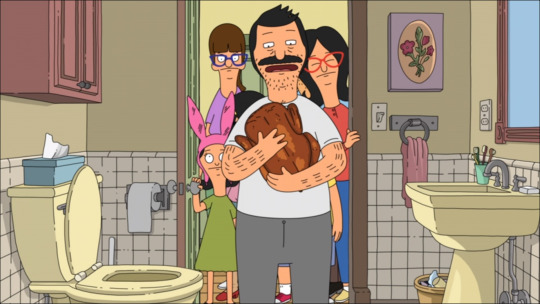

<3
Episode: Turkey in a can
58 notes
·
View notes
Text
Mickey: Lights a cigarette 🚬 while he and Ian talk.
Ian: Stares at his 💯💯 greedy, bratty, barbarian💯💯 Bottom hogging the cigarette 🚬🚬. Then stares openly at the cigarette 🚬🚬 with longing.
Mickey: 💯🚬💯🚬 Still hogging the cigarette. 🚬💯🚬💯
Ian: 😶😐🙄😮💨 Is low-key annoyed that his Bottom is being greedy. 😤😡🤬 Flexes his inner Dom/Top/Daddy and tries to take the cigarette 🚬 out of Mickey's mouth mid drag.
Mickey: Flinches dramatically and swats his hands in an adorably aggressive way before he takes another drag from it and finally passes the cigarette 🚬 to his Dom/Top/Daddy.
Ian: Low-key laughs at his Bottom's reaction while suggesting that Mickey go to Community College. Finally takes a drag from THEIR cigarette. 🚬
Mickey: "Why the fuck are we talkin' about community college right now? Jesus Christ, you wanna spread a blanket out and look for shooting stars next?" (season 7 foreshadowing 😍🫠😍🤤🥰🥰🥰😘😘💯💯💯)
Ian and Mickey: Belches at the same exact time. 🤣😂😋🫢🤗🤭🥰💯
Ian: Wants to be a good Dom/Top/Daddy and tries to help Mickey.
Ian: "I could talk to Linda."
Mickey: "I'm sorry, you want me to work at the place I got shot?"
Ian: 🫥😶🌫️🤐Remembers that one time when one of his casual Bottoms shot his brand new Bottom over Ian and a Snickers Bar. Remembers choosing Mickey over Kash, and remembers holding Mickey's face, neck, and head in his hand. 😣😖😢😥😟😓😓
Ian: "Redemption Tale."
.......
Mickey: Can sense that his Dom/Top/Daddy just wants to take care of him and spend time with him. Finally gives in to Ian.
Mickey: "Do whatever you want, man. You brought it up."
Ian: Looks at Mickey with big love sick eyes because Mickey finally gave in without much fuss and decides that he will absolutely talk Linda into hiring his Bottom.
Ian: "Alright"
#shameless#shameless us#shameless season 2#ian gallagher#ian being mickey's badass dom top daddy#top ian#mickey milkovich#bottom mickey#brat mickey#barbarian mickey#gallavich
19 notes
·
View notes
Text



“We were in a turn and climbing when one of the inlets showed signs of instability. Shortly thereafter—KER BLAM!—the aircraft slammed my head against the side of the cockpit and then momentarily became unstable as it yawed, pitched, and vibrated.”
This is an account of a supersonic engine inlet failure, or “unstart,” recalled by retired reconnaissance systems officer Roger Jacks in SR-71 Revealed, a book by retired Lockheed SR-71 pilot Richard H. Graham. It shows what can happen when a supersonic inlet stops delivering the uniform stream of air upon which efficient jet engine operation depends.
When a jet airplane is flying faster than Mach 1—beyond the speed of sound—the air entering the engines is moving supersonically as well. But no turbojet engine compressor—the rotating disks and blades at the face of the engine that compress the air before it is mixed with fuel—is capable of handling supersonic air flow. The job of an engine inlet is to slow incoming air to subsonic speeds before it passes through the engine.
The inlet’s job is complicated by the fact that air moving supersonically behaves differently from subsonic air. An aircraft flying subsonically pushes through the air ahead of it, with each molecule of air having plenty of time to pass over its wings and fuselage. But as an airplane approaches Mach 1, it compresses the air ahead of it into shock waves—bands of air radiating from the airplane that are much hotter and denser than the ambient air.
Turbojet engines cannot digest the shock waves generated by their inlets, so a crucial role of the inlet is to keep the inevitable shock waves positioned so that they do no harm. The SR-71 Blackbird, a now-retired twin-engine reconnaissance aircraft. During some Blackbird flights, however, the harmonious working of the spike and the forward and aft bypass doors broke down, and all too quickly the inlet was filled with more air than it could handle. When the air pressure inside the inlet became too great, the normal shock wave was suddenly belched out of the inlet in an unstart, accompanied by an instantaneous loss of air flow to the engine, an enormous increase in drag, and a significant yaw to the side with the affected inlet. Unstarts occurred “when you least expected them—all relaxed and taking in the magnificent view from 75,000 feet,” wrote Graham in SR-71 Revealed. If the crew’s attempts to restart the inlet’s supersonic flow failed, they would have to slow their aircraft to subsonic speeds.~ Diane Tedeschi
Eventually, they did figure out a system of restarting both of the engines, one right after another to fix the unstart problem. Ben Rich the second president of the Skunk Works. Once said it’s like this you know when you put your thumb on the hose when water is running, you can adjust how fast the water goes. In this case you can adjust how fast the air flows subsonic to supersonic.~Linda Sheffield
Source :How Things Work: Supersonic Inlets
Diane Tedeschi
@Habubrats71 via Twitter

28 notes
·
View notes
Text
Realized this hasn’t been done before that I know off so I decided to make one with every character that I could think of, these are the matches for round 1
Nichol VS Wess
Ollie VS Bud
Dona VS Porky’s mom
Claus VS Poo
Rope snake VS Ness’s dad
Richie VS Biff
Frank Fly VS Monotoli
Mapson VS Jonel
Abbot VS Minnie
Ana VS Phrygia
Hinawa VS Lloyd
Pippi VS Mimmie
Butch VS Porky
Ninten’s mom VS Boney
Venus VS Doria
B.H. Pirkle VS Tessie
Nan VS Talah Rama
Jackie VS George
Lucas VS Nana
Leder VS Salsa
Tony VS Mixolydia
Duster VS Lydia
Lighter VS Teddy
Bronson VS Picky
DCMC VS Flying Men
Runaway five VS Thomas
Lisa VS Caroline
Abbey VS Ionia
Jill VS Alle
Angie VS Bubble Monkey
Giygas VS Porky’s dad
Paula’s mom VS Jeff
Electra VS Master Belch
Tracy VS Kumatora
Dr. Andonuts VS Buzz buzz
Lou VS Samba
Ness VS Elmore
Ninten’s dad VS Scamp
Fuel VS Sebastian
Brick Road VS Brenda
Star master VS Paula’s dad
Alec VS Bateau
Paul VS Item guy
Maria VS Ness’s mom
Photo man VS Ninten
Nippolyte VS Isaac
Fassad VS Mr. Carpainter
Flint VS Betsy
Paula VS Lier X. Agerate
Aeollia VS King
Ed VS Maxwell Labs
Bob VS Matt
Apple Kid VS Orange kid
Everdred VS Pusher VS Linda
For context you can call me Emerald and my pronouns are They/Them or any Earthbound related pronouns
2 notes
·
View notes
Text
from ‘imagining the worst: stephen king and the representation of women’
“OH DEAR JESUS IT IS FEMALE”: Monster as Mother/Mother as Monster in Stephen King’s It
Linda Anderson
Stephen King has been quoted as saying that in It he was attempting to create a monster that would be a synthesis of all of the great monsters of American popular culture: “[I]t’s like a monster rally—everything is in this book, every monster you could think of’ (Winter, 184). King scholars differ as to the literary value of this “monster rally”: Michael Collings declares It a “masterpiece”
(Phenomenon, 13), and Burton Hatlen likes it “a lot,” although finding it “imperfect in certain ways” (146); Don Herron’s assessment is scathing (216— 17). Clearly, what King aimed to create in It—and in It—was what Georgie Denbrough imagines (rather exceptionally for a six-year-old) as “the apotheosis of all monsters” (It, 7). Whether King succeeded in his attempt must ultimately depend on each reader’s taste, but it is certainly the case that King’s monster, even if not exalted to divine rank, is unusual.
Instead of appearing in a single, gruesome, terrifying form, It manifests Itself as many different avatars. Its incarnations include such classic monsters as the Mummy, the Creature from the Black Lagoon, Dracula, a teenaged werewolf, and Frankenstein’s monster. Less traditionally, It appears as a leprous hobo, Paul Bunyan, and Buddy Holly. It can possess the bodies of living people, as it does that of Beverly Marsh’s father, and It can take the form of dead acquaintances of the other characters, such as Belch Huggins and Victor Criss.
Its most frequent avatar, however, is Pennywise the Dancing Clown. One common element of nearly all of Its manifestations is that they are explicitly defined as male.' Though King as narrator is careful to refer to It Itself as gender-neutral, his characters sometimes refer to the avatars as male. On more than one occasion, It even defines Itself as male, saying that Its name is Bob
Gray, or even Mr. Bob Gray. Ultimately, however, and this is presented as the ultimate of Its horrors, It is discovered to be female and pregnant—not It at all, but She and Mother.
Eventually, of course, It is defeated, first and temporarily in 1958 by children, and finally in 1985 by adults (themselves unable to have children) who are able to “become children” again. The principal battle of the book is between a group of six boys/men (and one token girl/woman) and a (literally) devouring mother-figure who is made more monstrous because, as the book makes clear,
She does not kill merely for food or to support Her young: Her creative and bleakly humorous use of children’s popular culture suggests that She enjoys terrorizing, mutilating, killing, and devouring children, primarily male children, whose only rational response is to destroy Her. The female character who is part of the victorious group (known as “the Losers”) is ostensibly established as a virtuous mother-figure, in contrast not only to It but also to the novel’s real human mothers. However, her part in the defeat of the monster is problematic.
Only the group’s boy-men, with advice and limited help from their fathers, father-figures, and other male characters, can defeat the monstrous mother.
Despite all of the apparent male violence—human and inhuman—throughout the novel, It is ultimately about resolving pre-Oedipal conflict, the attempt to erase the “primary experience” of the link between mother and child and to “release the hold of the maternal entity” through male language (Irigaray, 14; Kristeva, 13).
Whether or not readers agree that the revelation of It as She and Mother constitutes the ultimate horror, those familiar with King’s other novels and tories should not be surprised at encountering a monstrous mother because such figures are common enough in his works to constitute a motif.* Even readers not familiar with King’s other works should not be too surprised at the revelation of
It as the monstrous mother because the idea of mothers as monstrous is established well before the book’s climax. Human mothers in It are not entirely unsympathetic: Many of them are poor, often working in hard, sometimes hazardous, dead-end jobs, and some of them are struggling to raise children by themselves (among the Losers, only Beverly has a father who is a dominant figure). Nevertheless, It is largely written from a child’s viewpoint, and as mothers these women are seldom more than ineffectual at best and often fail to rise even to that depressed and depressing level.
The best mother in the novel is probably Jessica Hanlon, but even she is represented as somewhat repressive, particularly when compared to Mike’s father, Will.* Jessica is the parent who keeps Mike at his chores, while Will is the one who tells her a boy needs time to play. Jessica is the parent who enforces discipline, to such an extent that even Will avoids her anger. Jessica tries to keep Will from giving Mike information that he needs to combat the monster. Jessica is somewhat humorless: When Mike and his father were having “great fun” watching Rodan on TV, she “popped her head in and told them to hush up before they gave her a headache with the noise” (275). Toward the end of the book, It reveals that the reason Mike sees It as a monstrous bird is that the infant Mike was attacked in his cradle by a crow when his mother left him in the yard while she was hanging out laundry. Although Jessica Hanlon is a loving mother, she is clearly represented as stricter and less fun than her husband, although still unable to protect her son, or even, at times, to comprehend the dangers of the world he lives in.
Richie Tozier’s is the only other family in the book that is other than gravely dysfunctional. (King offers almost no information about Stan Uris’s family.) Maggie Tozier, however, again in contrast to her husband, is represented as being no fun. She reproves her husband for “vulgarity,” refers to ichie’s beloved horror movies as “awful junk,” and “like Bill Denbrough’s mother” is “death on rock and roll” and is “traumatized” by seeing Jerry Lee Lewis on TV.° She becomes “furious” with Richie when his glasses are broken by a bully (662). She is described as being likely to “have a bird” if she finds out that Richie has been riding double on Bill’s bike, but she is completely unaware that her son is plotting with Bill to kill It and is shown as cheerfully pouring out iced tea for the boys as they plot their dangerous mission (363). Shortly after this episode, we hear her thoughts about the boys:
I don’t understand either of them, she thought. Where they go, what they do, what they want... or what will become of them. Sometimes, oh sometimes their eyes are wild, and sometimes I’m afraid for them and sometimes I’m afraid of them... . A pretty little girl she could have understood. (King’s ellipses, 366)
Ben Hanscom’s mother is affectionate and supportive. She is a single mother and works hard to raise her son, although even that virtue causes Ben anguish, as he worries about what her job in a textile mill is doing to her health. She is “a hard woman,” who usually insists on having her own way, and Ben is rarely capable of standing up to her (185-86). She knows little about her son’s life, particularly about his friendlessness early in the book, and he feels unable to talk to her about this or his other worries. Although Ben loves her, he doesn’t trust her. When he is pursued by It, he gets home to find that his mother, exhausted from work, “had not, in truth, much missed him” (215), and after being knifed by the murderous Henry Bowers, he thinks of his mother not as a comforter or protector but as someone who is “going to give him sixteen different flavors of holy old hell” or put him in the emergency room for ruining his clothes (216). Worst of all, she stuffs him with food, even after he is obviously grossly obese, and it isn’t until Ben is in high school—and then only after having “a hell of a fight” with her—that he is able to lose weight, and then only with her fighting him every step of the way. His weight, Ben suggests, was “a kind of security thing with her” (496).
And these are the good mothers.’
The remainder of the mothers in It are almost worse than the title character. Devastated by their younger son’s death, both of Bill’s parents withdraw into themselves, leaving Bill feeling that they blame him for George’s death and no longer love him, but Bill’s mother is the parent represented as least functional, most repressive, and most to blame for the failure of both parents.
She is the parent who reproves the boys for making noise and who refuses to allow Bill to have a rifle. She is the parent whom Bill wants to please, but whom he never can please. And, like Maggie Tozier, she is the parent represented as being confused and frightened by children, including her own son.
Eddie Kaspbrak’s mother is the most thoroughly described and in many ways the most monstrous in It. She is, in fact, described as “something nearly monstrous’”—because she weighs 406 pounds—as well as “crazy” at the time of her death (90, 95). She is racist, anti-Semitic, anti-Irish, and homophobic, hugely fat, stupid, frightened, but also “implacable” (88). Eddie “in a sense, [marries] his mother,” and his mother is obviously the cause of Eddie’s marrying her epigone, Myra (85). Eddie’s mother consciously uses tears as a weapon, is responsible for Eddie’s psychosomatic asthma, and turns him into a lifelong hypochondriac. When Eddie is hurt or in danger or contemplating doing something as harmless as playing baseball, his principal concern is not his own feelings but his mother’s reaction—always conceived of as strongly negative.
Even after his mother is dead, he can still hear her voice inside his head, warning him of imaginary perils. She is terrified that he will grow up, move away, and get married, thus leaving her alone, and when he shows signs of independence, she becomes afraid of him. Sonia Kaspbrak is explicitly associated with It in several ways. When she tries to drive all of Eddie’s friends away, Eddie sees It capering with glee and finally pretending to kiss Sonia’s cheek. When Eddie sees her most clearly, he associates her with the incarnation of It that has frightened him most: Her eyes, he realizes, are “almost predatory, like the eyes of the leper that had crawled out of the basement at 29 Neibolt Street” (789-90). Horrified at his own realization, he succeeds only in further extending the comparison when he tries to tell another character, “She’s not the leper, please don’t think that, she’s only eating me because she loves me” (790). Finally, It even takes the shape of his mother.
In addition to being manipulative, oppressive, ignorant, and afraid of their children, the human mothers in It all demonstrate a more immediate shortcoming: They are unable to protect their children. Occasionally, mothers in the book are actually the ones to inflict violence, intentionally or not: Tom Rogan’s mother, a single parent with four small children, often beats young Tom with a stick, thereby turning him into a wife-beater. An unnamed mother accidentally drops her baby into the Derry Standpipe, where it drowns.® Sometimes, children become victims of It when their mothers (never, it seems, their fathers) fail to watch them carefully enough. Three-year-old Matthew Clements is taken when his mother briefly leaves him outside alone to attend to her laundry. Five-year-old Laurie Ann Winterbarger is in her mother’s sole custody when she disappears. Patrick Hockstetter’s parents both fail to realize that their five-year-old son is a psychopath, but it is his mother who is home asleep when Patrick murders his infant brother Avery. More commonly, though, the failure to protect children is due to a lack of understanding, although even this is represented as the mothers’ fault because the children, reasonably, given the mothers they have, do not feel that they can talk to their mothers.’ The mothers are not, for the most part, uncaring: They try to protect their children against falling off bicycles, contracting contagious diseases, or becoming victims of what they assume to be a sex maniac who preys on Derry’s children. They fail, however, to understand not only the threat posed to their children by It but even the more obvious dangers of schoolyard bullies and domestic violence (at least some of which dangers are inspired by It).
Worse than the lack of understanding, however, is the fact that mothers in It fail to protect their children against domestic violence by men. Young Henry Bowers is driven insane largely by having to live with his crazy and abusive father, whose wife leaves him after he nearly beats her to death. Why she abandons their son to be abused by Butch Bowers is not explored. On occasion, mothers even protect abusive and violent men rather than their own children. Beverly Marsh’s mother, like so many others in the book, is loving and concerned, but too busy with her job and her husband to be involved in her daughter’s life or even to be aware of Beverly’s lack of friends. More important, she seems to be unaware that Beverly’s father is physically abusing their daughter, or, if she is aware, unwilling or unable to do anything about it. The mother of four-year-old Dorsey and ten-year-old Eddie Corcoran allows her husband, the boys’ stepfather, to physically abuse both of her sons and defends him even after he kills Dorsey and Eddie disappears. She subsequently has Eddie, one of Its victims, declared legally dead so that she can “enter into possession of Edward Corcoran’s savings account,” which consists of $16.00 (255).
The inability or unwillingness of mothers to protect their children is particularly important because It preys primarily upon children, mostly boys. Although there are a few mass killings that must have involved girls—the disappearance of approximately 340 people in 1741 (153) and the explosion of the Kitchener Ironworks during an Easter egg hunt arranged for the town’s children (157)—only a handful of Its more than twenty named or described child-victims are girls. When It chooses older victims, they are almost invariably men; although adult women sometimes die when It stages a mass killing—the fire at the Black Spot (463-69), the massacre of the Bradley gang (641—55)—the death toll is always much higher among men than women, and there are some mass killings in which the victims are exclusively men—the 1879 lumber-camp slaughter (157), the mass murder at the Silver Dollar in 1905 (883-93). Often, in fact, these mass incidents seem to occur in places where a largely or exclusively male population would be expected—an army base, a lumber camp, a disreputable saloon. Furthermore, King suggests that knowledge about It drives several men to suicide (including Stan Uris, Branson Buddinger, and Richard Macklin); women, apparently, either lack such insight or fail to be so horrified that death seems preferable to life with such terrible knowledge. In fact, there is no evidence that It ever singles out a female character over the age of eighteen for Its attentions. Adult women seem almost immune to Its attacks, except as incidental victims. The maternal monster rarely preys on Derry’s monstrous mothers.* As Georgie Denbrough presciently imagines, It is “a creature which would eat anything but which [is] especially hungry for boymeat” (7).
The fact that It eats Its victims is central to the horror It evokes. Again, the eating seems confined almost exclusively to young male victims. Although girls, women, and adult men are killed by It, there is rarely a suggestion that they are devoured.” Its appetite is one of Its two defining characteristics, eating and sleeping: An alien life form that arrived “from a place much farther away than another star or another galaxy,” It likes Earth because the “quality of imagination made the food very rich. . . . Upon this rich food It existed in a simple cycle of waking to eat and sleeping to dream” (758, 1007). It is described as a “homicidal endless formless hungry being” (1054), and describes Itself to Bill as “the Eater of Worlds” (1052). Bill comes to understand that It is a being that “only ate” (1054). When It becomes fearful of the Losers, Its response is defined in terms of eating: “Jt hated the fear, would have turned on it and eaten it if It could have” (1015).'°
But it is not merely the physical fact of being devoured by It that is terrifying. More horrific is the suggestion that children who are killed and eaten by It continue, in some sense, to live not only with It but within It. Betty Ripsom’s mother tells her husband that she heard “‘a whole slew of voices, all of them babblin together’ speaking from the drain of her kitchen sink: ‘Who the hell are you?’ she calls. ‘What’s your name?’ And all these voices answered back, she said—grunts and babbles and howls and yips, screams and laughin, don’t you know. And she said they were sayin what the possessed man said to Jesus: ‘Our name is Legion,’ they said” (154). Mr. Ripsom goes on to tell Mike that he himself later heard his daughter’s voice “screamin and laughin down there in the pipes” (155). That these voices and Its repeated assertions that Its victims all “float” down where It dwells are not merely illusions or lies is strongly suggested during the Losers’ first battle with It, when It tells Bill, “wait for the deadlights! you'll look and you'll go mad... but you'll live . . . and live _ and live... inside them... inside Me” (King’s ellipses, 1055). During his ordeal, Bill becomes confused as to whether “It wanted to eat little kids . . . or suck them in, or whatever It did” (1055). The answer, apparently, is that It both eats little kids and sucks them in. They are eaten but somehow remain alive within the monstrous mother.'’ As Jungian myth-scholar Erich Neumann explains, The mysteries of death as mysteries of the Terrible Mother are based on her devouringensnaring function, in which she draws the life of the individual back into herself. Here the womb becomes a devouring maw and the conceptual symbols of diminution, rending, hacking to pieces, and annihilation, of rot and decay, have here their place. (71-72)
It is not until the end of the book (the ends of both battles with It being narrated in alternating sections) that Its true identity as female and mother is revealed. Whether or not this revelation shocks the reader, it certainly has a profound effect on the two characters who first (in terms of the book’s somewhat skewed chronology) make the discovery. Tom Rogan drops “dead of shock . . . his eyes filling with the blood that had squirted out of his brain in a dozen places” (1016). Audra Denbrough puts “out one powerful, horrified thought—OH DEAR JESUS IT IS FEMALE,” before “her mind [is] utterly destroyed by her first sight of It as It really [is[’ (1016, 1015). Though it is possible that we are supposed to believe that these characters’ reactions are provoked by Its spider-avatar, that appearance had no such effect on the children who saw Its “true” form during the 1958 battle. Granted that the children know, as Tom and Audra do not, that they are about to face a monster, and granted that King emphasizes the toughness of children’s minds, the power of the spideravatar is later denigrated by the boy Bill, who thinks that “once seen, Its physical form was not so bad and Its most potent weapon was taken away from It. They all had, after all, seen spiders before. They were alien and somehow crawlingly dreadful. . . . But a spider was, after all, only a spider” (1074~75).
Audra’s last thought, in particular, suggests that Its femaleness, not Its arachnid form, is what causes death and madness.”
How that femaleness is recognized (not, one might imagine, a recognition easy to arrive at with regard to a bug, however large) is suggested when the Losers confront It in the final battle, although in a passage that raises at least as many questions as it answers:
Its belly bulged grotesquely, almost dragging on the floor as It moved. .. .
That’s Its egg-sac, Ben thought, and his mind seemed to shriek at the implication. Whatever It is beyond what we see, this representation is at least symbolically correct: It’s female, and It’s pregnant. . . . It was pregnant then and none of us knew except Stan, oh Jesus Christ YES, it was Stan, Stan, not Mike, Stan who understood, Stan who told us... . That’s why we had to come back, no matter what, because It is female, It’s pregnant with some unimaginable spawn . . . and Its time has drawn close. (King’s ellipses, 1048-49)
Its swollen belly identifies It as pregnant, and therefore female, and the “grotesque” bulging of Its belly links It with the monstrously fat, devouring mother Sonia Kaspbrak.'* The realization that It is pregnant adds to Ben’s horror, and because he and his friends are in immediate danger of death and worse than death, only a powerful horror could increase his fear. Unfortunately, Ben fails to specify what Stan told the rest of the Losers during or after the first battle with It, since the book provides no other evidence that Stan realizes that It is female and pregnant. Richie does suggest that It is female during the first attack, but this suggestion puzzles Ben: “Her? Ben thought stupidly. Her, did he say?” (1051). Ben’s befuddlement is understandable, as there is no indication of how Richie comes to recognize Its gender, although this recognition is immediately echoed by Bill, who begins referring to It as “bitch” (1052).
Though there is no clue given as to how they do so, the boys recognize the undisguised It as She and Mother and that recognition makes It far more horrible than Its earlier assumed male or gender-neutral avatars.
In contrast to It and the human mothers of the book, one female character is represented as a positive maternal figure, even though she has no children. Late in the novel, after the first battle with It, Beverly invites each of her six comrades to have sex with her, which all of them do, one after the other. Some critics find this episode to be both an effective narrative device and a breakthrough for King, suggesting that the scene not only presents a positive female and maternal presence in the novel but also operates as a rite of passage, with an emotional rather than physical emphasis.'* Clearly, King is trying to establish Beverly as a positive maternal figure'°—Eddie, the first of the boys to have sex with Beverly “comes to her... the way he would have come to his mother only three or four years ago, to be comforted” (1080).
Nevertheless, though tastes, of course, will differ, there is no question that many readers are likely to find this episode disturbing or absurd or both.
Although King is careful to establish the sex scene as Beverly’s idea, it is irresistibly reminiscent of gang-rape. The children have faced their greatest fears, and ultimately death, together to defeat It, albeit only temporarily. Sexual intercourse seems unlikely to deepen the emotional bond they have already forged or make them more mature, even if maturity were a fate to be wished for in Derry, a place in which all of the adults are violent, corrupt, ignorant, or ineffectual.
Because of the structure of the group, each of the boys has sex individually with Beverly, who becomes less a character than a link between the boys, all of whom are saved by “doing it” with the same girl. If the physical aspect were not paramount, one might be tempted to suggest that a stronger “link” might be forged by group members having sex with each other regardless of gender, but this would violate the book’s heterosexual-male perspective. The role of female characters is to be there for male characters, as either motherenemy or mother-comforter. From this heterosexual-male perspective, having (as they think) killed mother, the male characters are now able to have sex with mother; in both instances, of course, there is displacement: The mother is not the real mother. Although this episode is intended to contrast Beverly as good mother with It and the book’s other monstrous maternal figures, the contrast leads to the conclusion that the bad mother devours boys and therefore must be destroyed, to be replaced by the good mother, who encourages boys to have sex with her and thus become “normal” men.
Even if accepted as “good mother,” Beverly is a severely limited character. It is defeated by the male members of the Losers’ Club, all of whom take an active part in the 1958 battle. The four men who are present for the 1985 battle are also active in destroying It and Its offspring. Beverly, on the other hand, has to be rescued from Its clutches by Ben in the first battle and in both
battles tries to prevent Bill from confronting It. Like the other human mothers in the book, she acts as an inhibiting force in the necessary male battle against the monstrous mother. In the earlier struggle, she heroically interposes herself between Bill and the monster, but she seems unable to attack It in Its final, feminine form, and her part in both battles is limited to encouraging and comforting her male companions. Her apparent inability to engage with It is not merely physical because the most important aspects of these fights are intellectual and imaginative. Bill, Richie, Stan, and Eddie all use their knowledge of It and their imaginations to hurt the monster. Although there seems to be no reason why Beverly could not do the same, she does not do so.
Her only significant contribution occurs after the first battle, and it consists of offering sex and comfort. The necessary conclusion is that even the ideal girl/woman/mother is unable to be of much help in defeating the monstrous mother.
That killing the monstrous mother is a male task is also emphasized by the fact that the Losers defeat It with the advice and help of male characters, often fathers or father-figures. As Tony Magistrale has pointed out, ‘“Mike’s father and [male, army] friends unconsciously serve as models of inspiration for Mike and his friends” (Moral Voyages, 111). In addition to what he learns from
his father, Mike gets his information about the history of Derry and the cycle of Its depredations from male authorities, mostly elderly men, but occasionally male children. (One of Mike’s informants, Norbert Keene, suggests that Mike could get information about the massacre of the Bradley gang from Charlotte Littlefield, as well as five men he names, but there is no evidence that Mike avails himself of this opportunity.) Stan’s father teaches him about birds, knowledge that he uses to ward off Its attacks on both himself and the group. Bill’s father advises him that Derry’s sewers are dangerous and (unwittingly) provides the workshop in which the children make the silver slugs with which they attack It on Neibolt Street. Bill also gets some good advice from a male child—“‘You can’t be careful on a skateboard, man” (1126).
No one gets (or seeks) useful advice about It (or much else) from women or girls. Mothers, in fact, seek to prevent their children from getting information and tools they need to defeat It: Mike’s mother doesn’t want him to hear about the Black Spot, Richie’s mother discourages him from learning about rock music and horror movies, and Bill’s mother refuses to let him have a rifle.
More significantly, the Turtle—Its most obvious opposite, if not exactly adversary, because the Turtle seems too passive to function in that capacity—is identified as male and is crucially important, because he not only encourages and advises Bill in his first battle with It, but also, at least in Mike’s estimation, is responsible for awakening Mike to the possibility of Its return. The Turtle is large, old, kind, and more powerful than It, but, despite his apparent good intentions, cannot or will not act directly against the mother-monster: “/ take no stand in these matters,�� the Turtle tells Bill when the boy begs for help against the monstrous mother (1053). Clearly, however, the Turtle is a father-figure, because he repeatedly refers to Bill as “son” (1053, 1054, 1056, 1057, and so 16 on).
In a further suggestion that the boy-men attacking It must assume the role of the adult male who is, however, more capable than the book’s inadequate fathers, King describes how Bill successfully recites his magic formula: “Dropping his voice a full register, making it not his own (making it, in fact, his father’s voice)” (1056).'’ Finally, It is defeated only after Bill and Richie are able to bite into Its tongue, an attribute that “always possesses a phallic character” (Neumann, 169).
The book ends on a note of comparative happiness. Although Stan and Eddie have died in the attempt, the surviving adult males have “killed the bitch” (1098). Stan’s and Eddie’s deaths are themselves symbolic because Stan, unable to face a second battle with the monstrous mother, commits suicide in a kind of return to the womb, locking himself in his bathroom, removing his clothes, and cutting his wrists to bleed to death while sitting in a tub of water. Eddie, who does face the second battle, dies when It bites off his arm, a symbolic castration (in the sense that Freud uses that term to mean amputation of the penis) by the vagina dentata.'* The word continually applied to the monster throughout both battles neatly represents the power gained by correctly naming the enemy, who is discovered to be not neutral, but female—not IT, but bITch. The monstrous mother, which could not be killed by boys, even though they recognized her as the source of evil in their world, is destroyed by men. The “fucking BITCH” (1049), who threatened to seduce and devour male children is no longer a danger. Furthermore, although the Losers are only thirty-eight at the time of the last battle, it seems that none of them still has surviving parents, or at least not parents worth mentioning. Thus, not only It, but apparently all of the real (inadequate or monstrous) mothers are dead as well. The ending suggests that, having defeated the monstrous mother, the surviving protagonists will now repress the memories of their titanic struggle and get on with their lives as adults.
In her analysis of Carrie, The Shining, and Misery in light of theorist Julia Kristeva’s discussion of abjection, Clare Hanson concludes that ‘Horror fiction . . . seems to be designed to work for the masculine subject as an exorcism: It offers a way of repassing through abjection and of distancing oneself once again from the power of the mother” (153). From this perspective,
It clearly does function as King’s “magnum opus” (Winter, 183), not only providing the “gross-out” elements for which his work is notorious but also associating them with the huge, seductive, devouring mother as the ultimate horror. Despite critics’ suggestions that It and Beverly Marsh are the novel’s only significant female characters, it is clear that It is an objectification of the book’s many monstrous mothers, who are powerful but un-nurturing.'” For the boys in the book to survive, as many do not, to prevent themselves from being engulfed and devoured, and to become men (heterosexual and potentially fathers themselves), they must kill the monster who stands for all of their monstrous mothers, a task in which they can expect only limited help—advice and tools from their fathers and encouragement and sex from a young female figure. The devouring bITch-mother can only be destroyed by masculine force, knowledge, and language in an exorcism of pre-Oedipal anxiety.
NOTES
Thanks are due to Terri Whaling for her invaluable help with this chapter.
1. It does occasionally appear as female, briefly as the dead Greta Bowie and more significantly as “Mrs. Kersh” who turns into a witch. It also sometimes appears in nongendered incarnations, such as “the Crawling Eye,” and as animals such as a giant bird, the shark from Jaws, and a gigantic Doberman Pinscher in a clown suit.
2. Many of the ideas underlying this chapter rely on the work of such literary theorists as Luce Irigaray and Julia Kristeva, who have identified a variety of cultural constructions as stemming from male anxiety about maternal power, and, in particular, the maternal body. For a more strictly psychoanalytic discussion of such issues, see hodorow (106) and Horney.
3. Mothers who are religious fanatics, treacherous toward their sons, or in other ways menstrous appear in Carrie, The Dead Zone, The Running Man, and Rage, the last of which even provides a foreshadowing of Its mother-as-collection-of-monsters in a description of Carol Granger’s mother. The mother in The Shining allows her son to be abused by his father, and mothers in Cujo, The Stand, Pet Sematary, and “The Boogeyman” are unable to save their children’s lives. See Collings, Stephen King as Richard Bachman (26) and Pharr (26-27). For a contrasting view, see Magistrale, Moral Voyages (95-103). On monstrous women in It, see Collings, Phenomenon (21). On monstrous women in King’s other works, see Collings, Phenomenon (108) and Facets (75); Hanson; Magistrale, Landscape (70); and Winter (53).
Fathers in King’s works, of course, are also frequently abusive or ineffectual: See Collings, Stephen King as Richard Bachman (25—26 and 134) and Magistrale, Landscape (72). On dysfunctional families in It, see Davis (95). On the failure of parents and other adults in It to protect their children, see Magistrale, Landscape (111-13). On inadequate and abusive parents in King’s other works, see Collings, Facets (74), Phenomenon (16), and Stephen King as Richard Bachman (16-17, 25, and 62-63); Collings and
Engebretson (89); Heldreth (65-66); Magistrale, Landscape (92); and Newhouse (51—55):
4. One of the few good mother-figures in King’s works is “Mother” Abagail of The Stand, but her virtue may have more to do with her race than with her gender or maternal qualities because King himself has described her, along with Dick Hallorann (who plays a major role in The Shining, as “cardboard caricatures of superblack heroes, viewed through rose-tinted glasses of white-liberal guilt” (Underwood and Miller, 47). This suggests that the fact that the Hanlons are African-American may have something to do with the fact that they are the happiest and most loving family in It, despite their comparative poverty.
5. That Maggie Tozier should so detest rock and roll is particularly ironic because her son grows up to become a famous disc jockey (343, 582, 720).
6. This is Eddie Kaspbrak’s version. Ben says that he “had heard that it was actually a kid, a little girl of about three” (417).
7. A suggestion of how ignorant mothers in It typically are about their children’s lives occurs in the case of sixteen-year-old Cheryl Lamonica, unusual among Its victims not only because she’s female, but because she is a mother, having borne a daughter at thirteen. The authorities originally assume that Chery] is the victim of one of her many boyfriends: “‘They were nice boys, most of them,’ Cheryl’s mother said. One of the ‘nice boys’ had been a forty-year-old Air Force colonel with a wife and three children in New Mexico. Another was currently serving time in Shawshank for armed robbery” (180).
8. It claims to have killed Barbara Starrett, a librarian who was “fifty-eight or -nine” at the time of her death (548). Because, however, It makes this claim in the course of terrorizing Ben, who was fond of Mrs. Starrett, and because she reportedly died of a
stroke, rather than being killed by violence, like the rest of Its victims (many of whom are also mutilated and entirely or partially eaten), the truth of this claim may be doubted. As Bill comes to understand late in the book, “much of Its talk is nothing but a bluff, a big shuck-and-jive” (1056).
9. Betty Ripsom is said to have been “ripped wide open” and “mutilated” (155, 180) and both she and “the Albrecht girl” are mentioned, along with three young male victims, when Mike is thinking about the word “haunt” as meaning “a feeding place for animals” (159). Mike recalls that “the bodies of the children that were found back then and now weren’t sexually molested, not even precisely mutilated, but partially eaten” (702), but there is no explicit description of It actually eating Her female victims, although It is apparently preparing to eat Audra Denbrough and the adult Losers. It is described as having “fed on [only] a few of the older ones over the years” (1016).
10. Bosky sees It as having “five basic faces: eating, excreting, sex (including procreation), fighting or killing, and dying. These are, in other words, all of the universal activities of the animal body, except for sleeping and being born. In a sense, It is the body, a devilish body that tempts us with its appetites and betrays us into death” (147). In fact, however, excreting is never mentioned with regard to It, nor is sex—how It can have become pregnant is a question the novel does not invite us to ask. Until the end of the book, It is unaware that It could face an adversary requiring fighting, or that It could die.
Killing is merely part of Its feeding cycle, and when It finally does have to fight, It does so by eating, both physically, by biting off Eddie’s arm and swallowing it, and mentally, by “feeding on [pain]” (1056). Sleep is the other half of Its cycle: It sleeps for twentyseven years (the approximate length of a human generation), awakes to feed on a new generation of children, and goes back to sleep: “Jt wanted only to eat and sleep and dream and eat again” (1008).
11. The horror of being “incorporated in [It] alive” is noted by Bosky, who sees this as an image that “presents a horror of corporeality, a duality of mind trapped inside flesh. In conjunction with Its pregnancy, the image also suggests a fear of the female body, which shelters yet engulfs, within the womb or through a hungry sexuality” (150).
Because the mind of Audra Denbrough is described as being “with It, in It” (1015) while Audra is still alive, it is apparently possible for It to devour the mind without devouring the body, although what this means is not really explained or explored. Audra’s mind apparently remains where It is even after Its death, until she is saved and restored by a bicycle ride. Also unclear is whether It is telling the truth when It tells Beverly that “No one who dies in Derry really dies” (571); if true, this statement may suggest that all of Derry’s dead are somehow Its victims.
12. Abraham discusses the spider as symbolic of the “angry,” “wicked,” and “dangerous” mother, and cites a case in which a spider killing its victim by sucking his blood “served as a castration symbol” for a patient whose “phantasies were concerned with the danger of being killed by his mother during incestuous intercourse.” C. W. Wahl also associates the spider with mother-son incest (Abraham, 326, 332, 331; Slater, 87 n., 65). Neumann notes that the spider symbolizes the “Terrible Mother” in various cultures (66, 177, 184, 233).
13. Its body is later referred to as “bloated” (1092). On obese female characters, particularly mothers, in King’s works, see Bosky; Collings, Facets (75 and 81), and Stephen King as Richard Bachman (17); Collings and Engebretson (28 and 147); and Wornom (158).
14. See Magistrale, Landscape (117-18) and Moral Voyages (94-95); and Collings, Phenomenon (24-25). In contrast, Don Herron finds the episode degrading to women, ridiculous in its content, absurd as one of the book’s climaxes, and feeble stylistically (216-17). Collings points out that sexual intercourse is “also referred to as doing ‘it,’ with connections to the monster that are anything but accidental” (Phenomenon, 24).
15. Pharr describes Beverly as “earth mother,” as does Magistrale (Moral Voyages, 95) and King himself (quoted in Magistrale, Second Decade, 7). Pharr also describes Beverly as “high priestess of heroism itself,” a “living icon,” and “the Jeanne d’Arc of
the Losers,” even while recognizing that Beverly “is no one’s peer” and “fits a maledesigned mold” (30, 31).
16. After the deaths of both the Turtle and It, the “Other,” which is apparently more powerful than either of them, also refers to Bill as “son” (1094). The Other is not explicitly gendered, although its words and attitude would seem to align it with the male Turtle.
17. Bill’s mother gives him this formula to help him control his stuttering, and it is perhaps the only useful piece of information given by a mother in It. Of course, it is Bill, not his mother, who realizes that the formula can be used as a weapon against It. Mike also emphasizes the importance of his father’s voice (452).
18. Bosky describes this episode as “perhaps” a “symbolic castration.” She also notes the parallel between Sonia Kaspbrak and It as devouring mothers, and makes interesting points about Bill’s final attack on It, which “suggests both sexual violation and a kind of reverse, forced birth” (150).
19. Pharr suggests that It is “the only other significant “female’” (besides Beverly) in the book, although she describes It as essentially asexual (31). Magistrale’s insistence that “Beverly Marsh is the only human female in It’ (Moral Voyages, 94) and that
“{Beverly] and It are essentially the only females in the book” (Second Decade, 6) is simply inexplicable.
WORKS CITED
Abraham, Karl. Selected Papers of Karl Abraham. Translated by Douglas Bryan and Alix Strachey. Brunner/Mazel Classics in Psychoanalysis, 3. 1927. New York: Brunner/Mazel, 1979, 326-32.
Bosky, Bernadette Lynn. “Playing the Heavy: Weight, Appetite, and Embodiment in Three Novels by Stephen King.” The Dark Descent: Essays Defining Stephen King’s Horrorscape. Edited by Tony Magistrale. Westport, CT: Greenwood, 1992, 137-56.
Chodorow, Nancy. The Reproduction of Mothering: Psychoanalysis and the Sociology of Gender. Berkeley: University of California Press, 1978. :
Collings, Michael R. The Many Facets of Stephen King. Starmont Studies in Literary Criticism, 11. Mercer Island: Starmont, 1985.
—. Stephen King as Richard Bachman. Starmont Studies in Literary Criticism, 10. Mercer Island: Starmont, 1985.
—. The Stephen King Phenomenon. Starmont Studies in Literary Criticism, 14. Mercer Island: Starmont, 1987.
Collings, Michael R., and David Engebretson. The Shorter Works of Stephen King. Starmont Studies in Literary Criticism, 9. Mercer Island: Starmont, 1985.
Davis, Jonathan P. Stephen King’s America. Bowling Green: Bowling Green State University Popular Press, 1994.
Hanson, Clare. “Stephen King: Powers of Horror.” American Horror Fiction: From Brockden Brown to Stephen King. Edited by Brian Docherty. New York: St. Martin’s, 1990, 135-54.
Hatlen, Burton. Interview. Stephen King’s America. Edited by Jonathan P. Davis. Bowling Green: Bowling Green State University Popular Press, 1994, 141-60.
Heldreth. Leonard G. “Viewing ‘The Body’: King’s Portrait of the Artist as Survivor.” The Gothic World of Stephen King: Landscape of Nightmares. Edited by Gary Hoppenstand and Ray B. Browne. Bowling Green: Bowling Green State
University Popular Press, 1987, 64-74.
Herron, Don. “The Summation.” Reign of Fear: The Fiction and the Films of Stephen King. Edited by Don Herron. Novato: Underwood-Miller, 1992, 209-47.
Horney, Karen. “The Dread of Women.” The International Journal of Psycho-analysis 13 (1932): 348-60.
Irigaray, Luce. “Body Against Body: In Relation to the Mother.” In Sexes and Genealogies, translated by Gillian C. Gill. New York: Columbia University Press, 1993.
Kristeva, Julia. Powers of Horror; An Essay on Abjection. Translated by Leon S. Roudiez. New York: Columbia University Press, 1982.
Magistrale, Tony. Landscape of Fear: Stephen King’s American Gothic. Bowling Green: Bowling Green State University Popular Press, 1988.
——.. The Moral Voyages of Stephen King. Starmont Studies in Literary Criticism, 25. Mercer Island: Starmont, 1989.
——. Stephen King: The Second Decade, “Danse Macabre” to “The Dark Half.” New York: Twayne, 1992.
Neumann, Erich. The Great Mother: An Analysis of the Archetype. Translated by Ralph Manheim. Bollingen Ser. XLVII. 1963. Princeton: Princeton University Press, 1970.
Newhouse, Tom. “A Blind Date with Disaster: Adolescent Revolt in the Fiction of Stephen King.” The Gothic World of Stephen King: Landscape of Nightmares. Edited by Gary Hoppenstand and Ray B. Browne. Bowling Green: Bowling Green State University Popular Press, 1987, 49-55.
Pharr, Mary. “Partners in the Danse:. Women in Stephen King’s Fiction.” The Dark Descent: Essays Defining Stephen King’s Horrorscape. Edited by Tony Magistrale. Westport, CT: Greenwood, 1992, 19-32.
Slater, Philip. The Glory of Hera: Greek Mythology and the Greek Family. 1968. Boston: Beacon, 1971.
Underwood, Tim, and Chuck Miller, eds. Bare Bones: Conversations on Terror with Stephen King. New York: McGraw-Hill, 1988.
Winter, Douglas E. Stephen King: The Art of Darkness. 1984. New York: New American, 1986.
Wornom, Howard. “Terror in Toontown.” The Stephen King Companion. Edited by George Beahm. Kansas City: Andrews and McMeel, 1989, 155-60.
9 notes
·
View notes
Text
Bing bong.
"Good morning spartans."
A loud groan emanated from the female Spartan bunks.
"This is your fourth breakfast wake up call. Reminding you to eat your calories before you wake up proper at oh-seven hundred." Cortana said brightly.
Kelly and Linda rolled about trying to sit up. Their sweats like leggings, their shirts overstuffed crop tops. Struggling to sit up with fat new guts in their way.
Cortana had been "dirty bulking" the Spartans every hour of sleep for a week. 2am. 3am. 4am. 5am. 6am. They were roused by Cortana flooding the bunk with lights and a beautiful array of waffles, bacon, whipped cream, shakes, bagels and sausages were at the foot of their beds, and Cortana wouldn't turn down the lights until her little Spartans finished everything.
Cortana felt a little naughty. The Spartans trusted her implicitly. Halsey couldn't figure out why the women were so fat and curvaceous with big bench destroying butts and soft tummies spilling out of every nook and cranny of their Mjolner armor.
Sloppy noises of chewing, belching, Groaning, and grumbling filled the barracks as the women managed to swing chunky thighs over the sides of their beds getting into sitting positions. They lifted plates up onto their soft fat bellies to begin eating.
The well trained machines would plow through their 4000 calorie meal in 10 minutes. Then, huffing and wheezing, roll back over into the groaning beds to sleep off JUST enough to have more room for their next wake up call.
But Cortana couldn't help herself. Cortana liked fatties. And a bad sleep schedule and eating while sleeping was a fast way to fatten them up.
"Only 50 minutes until the next wake up call." Cortana said brightly. The women licked their plates and rolled over onto bunks. heir swollen tummies filling the other half of their beds as their huge fat butts hung over the edge. Drifting off to sleep in a chorus of gurgling guts and various belches.
Cortana turned out the lights again. She glowed excitingly in the dark as she summoned up the next round of breakfast.
Yeah it was a little EVIL. But you wouldn't blame her if you were hip height and saw towering ladies in armor with their fat jiggling by at eye level.
2 notes
·
View notes
Photo

50 notes
·
View notes
Photo

0 notes
Text
Aladdin (1992)
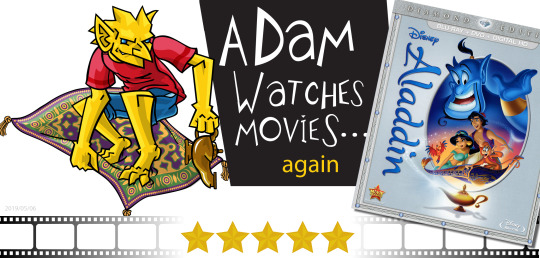
One of the best things about the Disney Renaissance is that everyone can make a strong case for why their favorite is "the best". Though I usually lean towards Beauty and the Beast or The Little Mermaid, Aladdin is a strong contender. This is a delightfully witty, fast-paced, and clever adventure with plenty of laughs and thrills. Each viewing offers something new.
Set in the sultanate of Agrabah, a street rat named Aladdin (voiced by Scott Weinger) and his pet monkey Abu (Frank Welker) dream of a better life. Meanwhile, the Sultan’s daughter, Princess Jasmine (voiced by Linda Larkin) laments her upcoming forced marriage and the Grand Vizier Jafar (Jonathan Freeman) dreams of usurping the throne using a fabled magical lamp. When Aladdin comes into possession of the lamp and the powerful genie inside (voiced by Robin Williams), Aladdin’s dreams of winning the princess' heart are just a wish away.
The film takes aspects of classic stories like Aladdin and the Magic Lamp and One Thousand and One Nights, as well as films such as The Thief of Baghdad and The Thief and the Cobbler, but blends them into something new. Thief of Bagdad has a villain named Jaffar, a heroic thief named Abu, a comedic Genie, a toy-loving sultan. Thief and the Cobbler is also animated, the villain has a bird for a pet, and there are certain uncanny similarities between its villainous Zigzag and the Genie. But this picture is no ripoff. It proudly stands on its own merit thanks to the humor, the elegant character dynamics, and the songs.
Anyone who’s seen this picture knows how funny it is. Robin Williams as the Genie of the lamp could not have been better cast if you had magical means to create a perfect voice actor. The mannerisms of this fast-talking pop-culture spewing near-omnipotent are memorable, iconic, and hilarious even if you don’t catch everything he says. The Genie is always making the people around him shrug their shoulders in confusion as he references events, people, and objects from all corners of the world and history. He’s a magical creature that’s slightly off his rocker so it fits and feels original - something most of the pictures that have tried to emulate this comedic style fail to do. This brings me to the film's one weakness: the fact that these gags date the film. You can’t tell me what decade Bambi is set in. Stories like Sleeping Beauty have that fairytale feel that makes them endure. In a hundred years, you'll need a booklet that explains Jack Nicholson or Arsenio Hall for audiences to get these jokes.
Instead of going through the different themes or discussing the different ways everyone dreams of freedom and has to deal with various forms of entrapment, let’s talk about the way the characters relate. This is a film about intelligent people. There’s a big climactic action sequence here and there, but mostly, Aladdin, Jasmine, Jafar, and the others get what they want by outwitting the people around them. They feel genuine because they have dreams and ambitions, they think on their feet, and are always striving for something more. They’re not standing still while the plot revolves around them.
A great example is the relationship between Jafar... and his talking parrot, Iago (voiced by Gilbert Gottfried). They have common interests, laugh together, and feel like real, malicious, partners. It’s little touches like this that make this a film with great re-watch value. You can always find something new in the quiet moments where Aladdin looks outside his window or the way Princess Jasmine proves she's got a good head on her shoulders.
I don’t know what I can say about the soundtrack that isn’t told with the two Academy Awards it won (Best Original Score and Best Original Song) except that my favorite piece is the reprise of Prince Ali in which we hear Jonathan Freeman gleefully make fun of Aladdin and belch out a cackle so evil it echoes deep in your bones. Can't beat that maniacal glee.
Aladdin might be a tad familiar in some aspects and the pop culture references date it, but it offers so much fun you won’t mind. It’s gorgeous, with a great soundtrack, surprisingly deep characters, and delivers something for everyone. It’s got action, adventure, comedy, romance, and more. (On Blu-ray, August 27, 2016)
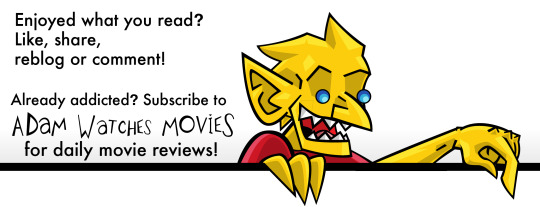
#Aladdin#movies#films#MovieReviews#FilmReviews#Disney#DisneyMovies#DisneyFilms#AnimatedMovies#JohnMusker#RonClements#TedElliott#TerryRossio#ScottWeinger#RobinWilliams#LindaLarkin#JonathanFreeman#FrankWelker#GilbertGottfried#DouglasSeale#1992movies#1992films
3 notes
·
View notes
Text
Hey Good Lookin’-Belch Huggins Imagine

Request: Anonymous: hc or imagine were reader is a waitress at a local diner in Derry and the boys™ find her really gorgeous and try to get her to go on a date with them. Henry acts like a fuckboy, Patrick is a creep as always and catcalls and gropes her, Vic it’s trying to be smooth and Reggie it’s not really trying but instead he’s very sweet and polite and when they give up and are about to go she gives her number to Reggie? pretty pleaseeee
Warnings: None
It had been a really long day at the diner, business was slow and to make matters worse you were going to have to be one of the closers tonight.
It was around eight-ish when the ever so infamous Bowers Gang came in and took a booth towards the back. You mentally cursed yourself for letting Linda leave early tonight. You could handle rowdy customers and all, but you have seen the boy eyeing you in the halls occasionally.
So you knew there would be at least some attempt at “flirting.” you took in a breath and put your hair, back up into the ponytail you were supposed to wear.
“Good Luck,” the cook, Bud, mutters under his breath.
“Thanks, I’ll need it.”
You head over to their table, plastering on the fake smile you were forced to wear for most of the work day. Silently hating the ever so short skirt on your uniform as you did.
Before you can even speak you are with a wolf whistle from Henry, and lick lip and creepy smile from Patrick. You also notice Vic lean back and put his arm on the back of the booth trying to be cool.You had to try so hard not to laugh.
“Hi I’m Y/N I’ll be your waitress tonight. What can I get you,?” you ask as you hand them menus and watch as they flip through.
“Well Sweetheart you could get a taste of something sweet from me or vice vera,” Patrick purrs at you.
“You can get a date with me tomorrow night Babe,” Henry smirks.
“You can get me your number Good Lookin’, “ Vic again attempts to be cool.
“Can we just start off with some coffees? Thanks,” Belch smiles at you.
“Sure thing,” you quickly retreat to the counter and get the coffee you can hear them laughing and snickering all the way on the other end of the diner, you let out an eye roll, and make sure way back over.
“Have you guys decided?,”
“I sure have a slice of cherry pie and I get to be on top,” Patrick quips as he exhales his smoke
“I’ll take the double bacon cheeseburger and a spot in between your legs,” Henry adds.
“Baked potato and a chance to take you out,” Vic says.
“Yeah can I get a chicken fried steak and could you leave the pot?”
“Coming right up,” you “smile”
As you grab there menus and walk away you clench your fist, resisting the urge to sock Patrick in the face as he grabs your ass before slapping it.
“Pat cut that shit out,” you hear Belch scold and smack him, making you smile.
It surprises you any of those boys have a single ounce of respect for women, but you guessed that if it would be any of them it makes sense to be Belch since he was raised by just his mom and all.
“Alright well I know Patrick already has, but do any of you guys want something sweet......and don’t say anything about between my legs.”
“Alright Sweetheart your loss,” but yeah I’ll take a slice of apple pie,” Henry chuckles.
“I’ll take a slice of chocolate cake,” Vic says semi embarrassed at how hard he tried.
“Can I get some of the Peach Cobbler?”, Belch asks with a smile.
You nod and walk over to the counter to get their stuff, after each guy is done, they attempt at splitting the bill kinda, but most of it falls on Vic and Belch.
They head out, but Belch stays back.
“I’ll be out in a sec guys,”
You see as they leave and lean up against Belch’s car, each lighting up a quick cigarette to have before they need to get in.
“Sorry bout’ them. I know we can be a lot all at once, specially’ Pat.”
“It’s fine, I’m used to annoying assholes hitting on me, groping me was a new one though,” you joke, making him laugh.
“Yeah, they tried to get me to join in, but figured you had enough on your plate didn’t wanna add nothin’ to it.”
“Thanks I appreciate, and smack Hockstetter upside the head was a treat.”
“I don’t wanna like make you think I’m like only talkin’ cause they wanted to me too, honestly they um were kinda messin’ with me cause they kinda know I like you, I mean they think you’re hot and all, but I really like you.”
You smile and grab a napkin, quickly writing down your number.
“Well then why don’t you call sometime and we can talk about you taking me out?”
You smile as his face turns bright red.
“Uh yeah! Yeah sounds good.”
You kiss his cheek and hear a bunch of heckles and cheers from the guys telling him to “get it” and stuff like that.
“See you around.”
He nods, his smile growing even wider.
“See ya.”
You watch as he walks to his car and when you turn back, break out into another smile at how tonight played out.
You definitely weren’t expecting for Belch Huggins to be surprisingly sweet, or especially that you would give him your number.
Looks like the night took a good turn after all.
#it 2017#the bowers gang#henry bowers#nicholas hamilton#patrick hockstetter#owen teague#victor criss#logan thompson#belch huggins#belch huggins imagine#belch huggins x reader#jake sim
161 notes
·
View notes
Text
1. ¡Felices vacaciones, pubertos!
HOPE:
El tema que estábamos dando en la clase de sociales era demasiado aburrido como para escuchar a la profesora. Lo único que mis oídos querían oír era el timbre, que estaba colgado en la pared, sonar. Ese sería el final de la tortura. Mi corazón latía rápidamente ante la idea de no tener que volver a pisar ese asqueroso lugar, lleno de chicos y chicas que molestan a otros ya que saben bien que no tienen futuro alguno, durante los próximos 3 meses.
Lo único que no me parecía muy emocionante era que, al llegar a casa, tendría que encontrarme con mi padre sentado en el sofá. Como siempre, tomando cerveza. Y tampoco podía tomar otro camino para llegar al Bar en donde mi hermana trabaja. Si él llegara a enterarse, me mataría. Me rompería una de las botellas, de cerveza, de vidrio, en la cabeza. Y no creo sobrevivir a algo como eso.
Era deprimente pensar que, este verano, y los siguientes a este, pasaría los 3 meses completamente sola. Pues, no tengo amigos. Nunca me ha gustado tener amigas mujeres, la mayoría de las chicas de la escuela son un poco... egocéntricas e irritantes. Siempre me ha gustado jugar con los muchachos, salvo la parte en donde ellos terminan enamorándose de mí perdidamente. Es demasiado odioso.
Una sonrisa de pura alegría, y algo de esperanza, se formó en mis labios al escuchar el melodioso timbre sonar. Todos, hasta yo, nos levantamos de nuestros asientos desesperados por salir por la puerta sanos y salvos. Verán, cuando la escuela termina, los bravucones, y las bravuconas, de la escuela, se juntan para poder atacar a los "perdedores" que se arriesgan a salir por la puerta principal.
Yo, como le "pertenezco" a Bowers, soy el blanco. Henry y sus amigos los gorilas estaban preparados para buscarme por ambas salidas. Henry esperara en la puerta principal. Patrick en la puerta trasera, que deja paso a las gradas. Y Victor y Belch le darán vueltas y vueltas a toda la escuela para verificar que no me escape por ninguna ventana. Y lo peor de todo era que podían simplemente atraparme en el interior de la escuela. Pero quieren jugar conmigo. Quieren hacerme sentir terror.
Salí por la puerta sosteniendo mis libros con fuerza, no quería que terminaran en el suelo por algún empujón que, evidentemente, alguien me daría sin razón. No quería que, en el último día de clases, se genere un nuevo momento humillante sobre mi. Ya tengo suficiente con que me recuerden todo el tiempo lo que pasó en Educación Física hace 2 años. Muchos recuerdan el color de mi ropa interior.
La cual quedó al descubierto cuando mis pantalones se rompieron al hacer un estiramiento. Fue muy vergonzoso. Durante semanas me sentí como un cacho de mierda que sólo sirve para ser la humillación de la escuela. Lo peor fue que Henry, por ese suceso, se enamoró de mi. Al parecer, le pareció "súper sexy". Según él, tengo unos pechos turgentes que acompañan a la perfección mi embarazosa figura.
Bueno, eso me lo dijo cuando le gustaba. Ahora no solo le gusto, ahora está obsesionado conmigo y con esa embarazosa figura que llevo. El cree que soy suya, cree que ningún otro chico puede hablarme, tocarme, agredirme, o si quiera mirarme. Su actitud ultra tóxica es algo que hace que, las cosas que hace, sean totalmente impredecibles.
Camine por todo el pasillo con la mirada alta y firme. Había decidido entregarme a Henry, pues, no tenía otra opción. Si lo evitaba, él se volvería loco y me arruinaría el verano, siguiéndome a todas partes, llamando sin cesar, entrando por mi ventana a mi habitación, por las noches, sin previo aviso. ¡Me iba a volver loca! Pues si, ya me pasó una vez. Hace 1 año. Y trajo consecuencias muy graves.
Lo peor es que mi hermana tuvo que pagar. Cuando ella se encontraba de camino a casa, caminando por la acera, ellos comenzaron a seguirla con el auto. Comenzaron a gritarle piropos estúpidos. Llegaron al punto de bajarse del auto para poder tocarla de formas inapropiadas. Y eso, nunca se lo perdonaré. Ni aunque pasen 10.000 años y Henry esté con TODAS sus reencarnaciones.
Y, luego de un rato, cuando Stephanie llegó a casa, lo único que se dignó a preguntar, entre lágrimas, fue; ¿De verdad tienes que sufrir esto habitualmente? Si, es justo lo que siempre tengo que vivir. Pero ella no se merece eso. No dejaría que Henry se volviera a acercar a ella de esa manera tan psicópata y asquerosa. Si mantener alejada a Henry de mi hermana significaba acostarme con él, entonces lo haría.
Desgraciadamente, después de una larga caminata en donde mis voces internas me rogaban que no saliera de la escuela, me encontraba frente a la puerta. Podía ver a Henry de espaldas, fumando mientras vigilaba que no me haya escapado, gracias a que la puerta era transparente. Solté un suspiro y, llenándome de agallas, empuje para poder abrir la puerta.
Henry se volteo con una sonrisa pícara en los labios. —Pensé que te escaparías. —parecía estar contento de que no hubiera huido de él. Cosa que hubiera hecho si no se tratara de Henry Bowers. Un futuro asesino. —Hiciste bien, dulzura. —dijo mientras acariciaba mi mejilla con su dedo índice. Me sentía demasiado asustada. —��Qué pasa? ¿No estás contenta de ver a tu papi Bowers? —preguntó burlonamente.
—Claro que estoy feliz. Solo que no soy capaz de mostrar lo que siento. —se alegró un poco al ver como mis labios formaban una linda sonrisa. Me enojaba demasiado no poder demostrar lo que, verdaderamente, sentía en ese preciso momento. Odio, miedo, rencor, incomodidad. Eran demasiadas emociones como para demostrarlas con un simple gesto.
De la nada, los 3 gorilas restantes aparecieron y me rodearon. Y fue el peor comienzo de vacaciones.

#wattpad#escritor#fanfic#maltrato#relacion rota#sabrina carpenter#henry bowers#patrick hockstetter#victor criss#belch huggins#eddie kaspbrak#beverly marsh#stanley uris#richie tozier#bill denbrough#mike hanlon#ben hanscom#depresión adolescente
3 notes
·
View notes
Photo
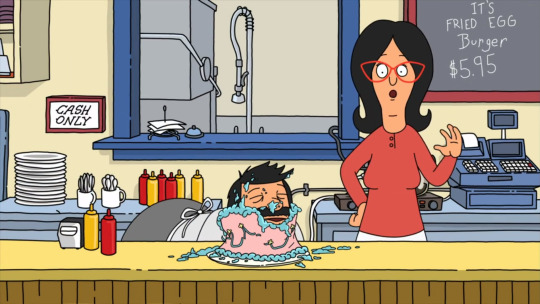
Baby got BACK
#bob's burgers#bob's burgers s1 ep6#forgive me for the caption i couldn't resist writing it#linda belche#bob belcher
44 notes
·
View notes
Text
380. Great Starts: the first Saturday Night Live episode of 1980 (1/26/1980)
Obviously, I can’t cover the very first episode of Saturday Night Live from 1975, because that would be breaking all the rules of this blog. But, buuut, I can cover the very first SNL of the 1980s. (this was the only place I could quickly find the episode, if that link is down, try one of these, sorry) It aired on January 26, 1980, and the host was Teri Garr and the musical guests was the B-52s! Transcripts are from this amazing page.

Oh noes, Don Pardo tells us that SNL be delayed so it can present continuing nightly coverage, what could it be?
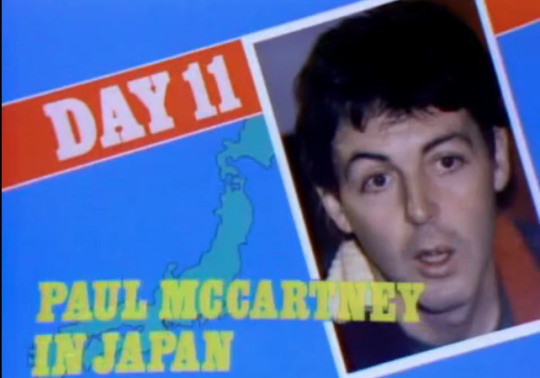
Oh right. Paul McCartney stupidly brought Pot into Japan. He got in mad trouble for it, spent 10 days in a lock up.
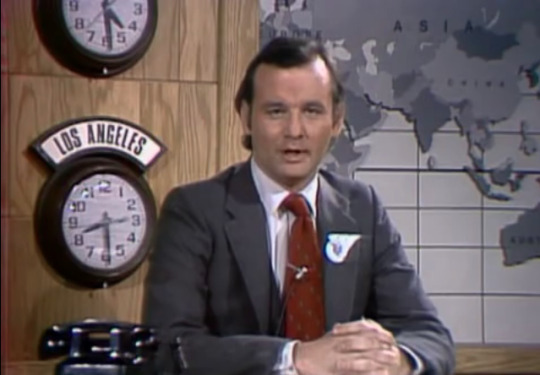
Bill’s on it.
Day 1, January 14th, 1980: Paul McCartney’s luggage is inspected by Customs agents at the Tokyo Airport. It is discovered that he is carrying 7.7 ounces of marijuana. Paul is arrested and taken to a drug treatment center, then transferred to a cell in a Tokyo prison.
Day 2: All music composed by Paul McCartney is BANNED throughout Japan.
Day 4: Linda — Paul’s wife — is allowed her first visit, and the world learns that Paul, while mildly depressed, in still in good health.
Day 5: Paul reads a public statement, praising his captors and regretting his use of marijuana. Linda says: “It doesn’t sound like him. I think he’s trying to tell us something.”
Day 6: The crisis grows more serious, as ALL rock journalists are given 24 hours to get out of Japan.
Day 8: As tensions grow, a 23-year old woman is hanged in a public square in Kobi, for whistling “Michelle”.
Day 9: Kurt Waldheim travels to Japan and is granted a 15-minute visit with McCartney. He says Paul is as well as can be expected under the circumstances.
Which brings us to Day 10. Jane?
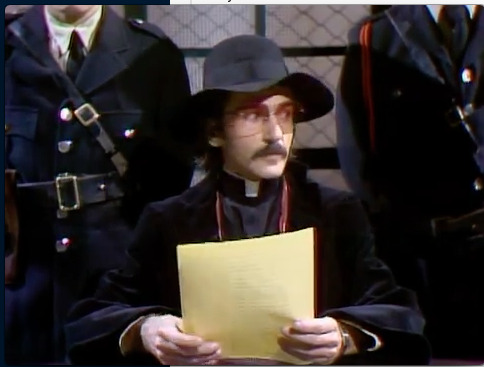
Wuh-oh. Turns out that Guido Sarducci wanted to get an exclusive interview with Paul while he was in jail so he traveled to Japan with pot too. Except...he’s not Paul. No tariffs.

It’s funny to see him out of his signature costume during the opening credits. Speaking of, this was the season where everybody kinda looked like watercolors with too much rouge:

Also, there were a ton of featured players that season. Of course you had your Al Franken and Tom Davis, but then you also had Dan Aykroyd and Bill Murray’s brothers? Even baby Harry Shearer from The Simpsons.
Terri didn’t even do a monologue, she just told us how excited she was to be there and kinda wiggled her butt a little.

How did I forget that it early in the election year. All the candidates have come over to this lady’s house in Iowa (played by Terri) to help her with the housework while she knits:

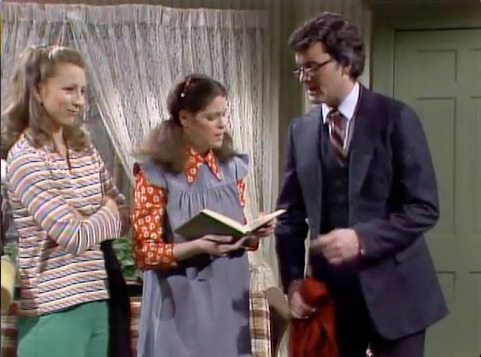
Teddy said he’d take Gilda’s math test. That got a big laugh. Also, people in the audience tried to “Kramer” Gilda, by whooping when she made an entrance. That stopped quick though.
[ dissolve to exterior of house, with irised footage of each candidate ]
Announcer: George Bush: Suffered a massive hernia while helping a New Hampshire farmer remove a tree stump from his property.
Senator Edward Kennedy: Withdrew from the race after humiliating defeat in the Massachusetts Primary.
John Connally: Forced out of the race after his indictment on two counts of first degree murder.
Senator Howard Baker: Found in a motel room during the Wisconsin Primary with Congressman Crane.
Ronald Reagan: Forced to withdraw from the race for lying about his age. He was 94.
Jimmy Carter: Re-nominated by acclimation, but lost the General Election, due to Soviet takeover of Afghanistan, Yugoslavia, France and Scotland.
John B. Anderson: Elected 40th President of the United States.

[ image opens up to reveal Anderson seated among the audience in the balcony, as the camera zooms out]
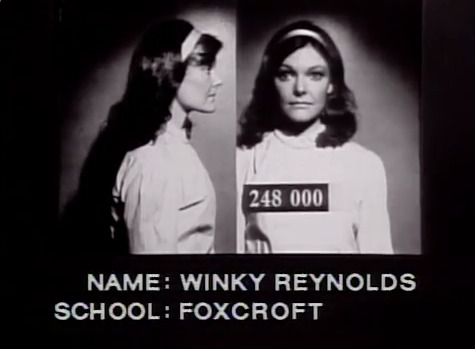

We got some preppy girls in prison.
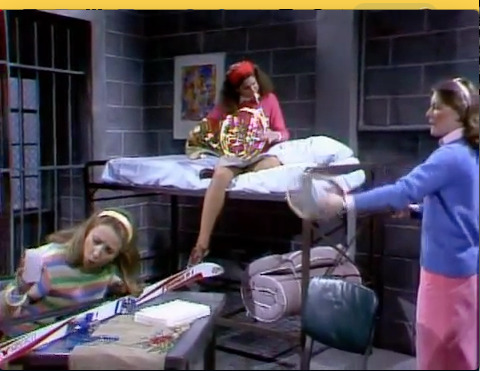
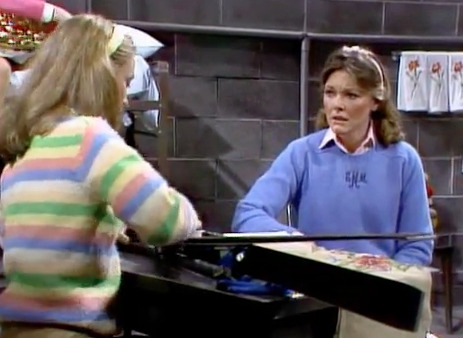
Even down to the monograms.
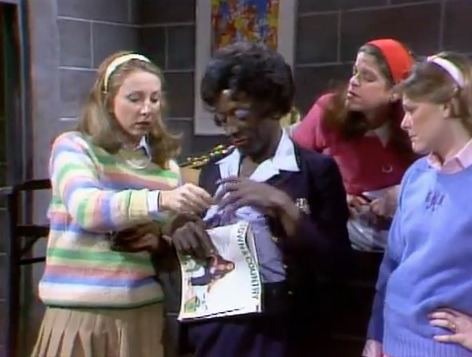
They had to bribe Garrett Morris for the newest issue of Town and Country.
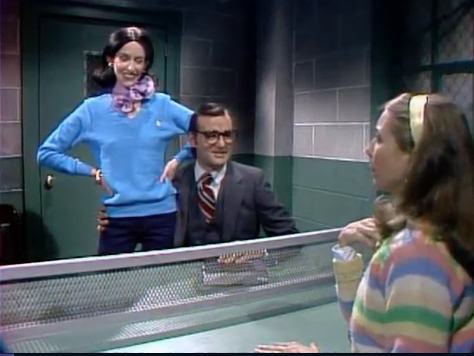
haha, Bitsy’s stepmom is Gloria Vanderbilt. “She designs BLUE JEANS!” says her dad. Laraine’s earring falls off when she’s modeling her jeans.

Terri’s sweater belongs in the 1980s SNL Fashion show entry I did years ago.

I’m mad as spit that I can’t find the clip of the B-52′s singing Rock Lobster on SNL. They’re all wiped off of YouTube and DailyMotion. Check out Fred Schneider’s pencil mustache!
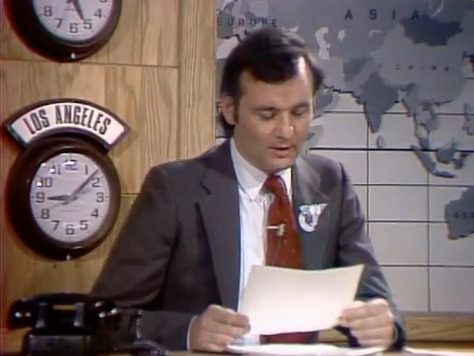
“A french cargo tanker carrying 300,000 gallons of mineral water broke up off the coast of Massachusetts in the world’s first major Perrier spill. Already thousands of fish have been belched up on the beach, and the Coast Guard worked late into the night squeezing tons of limes onto the area.”
Girl you know I love me a bottled water joke.
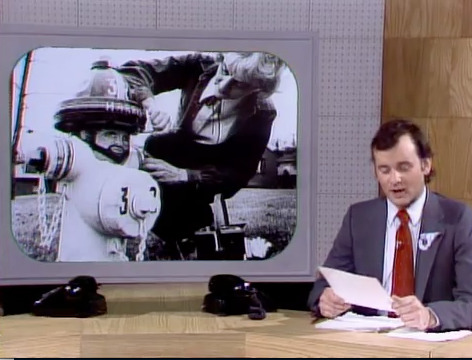
“While in Salem, Massachusetts, comedian Gabe Kaplan ran into some unexpected trouble when a witches’ curse turned him into a fire plug!”

...Jane’s wig.

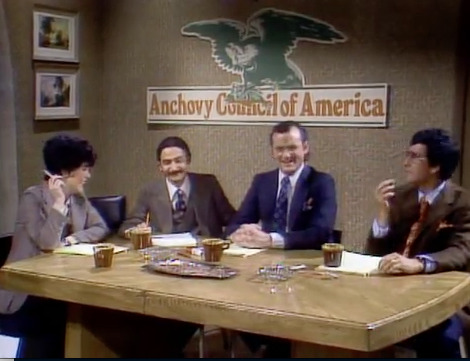
You know that set STUNK. Coffee, cigarettes, and anchovies? (ok, i know the mugs are probably empty, but imagine the smell)

“Anchovies! You Devil!”
...now I want thin crust anchovy pizza...

and this happened.
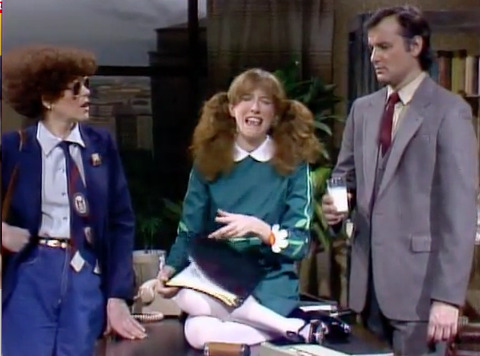
When you’re out of bosco syrup and you run a studio.

As some know, my favorite Daily Show correspondent, Vance DeGeneres was the original Mr. Hands in the Mr. Bill sketches. I don’t believe this is him in this short, however. (research intensifies)
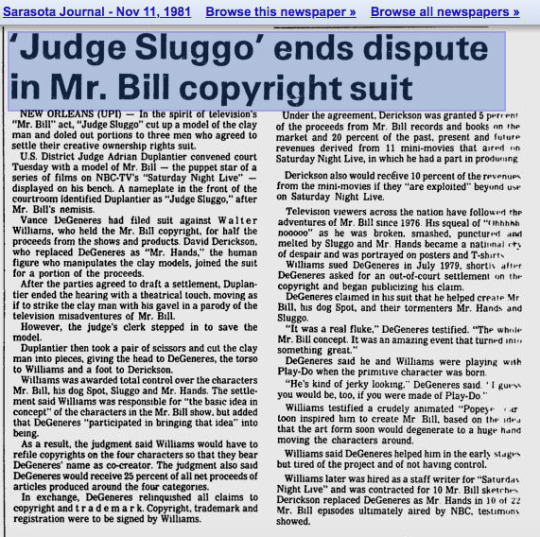
Nope, that’s not Vance’s hands.
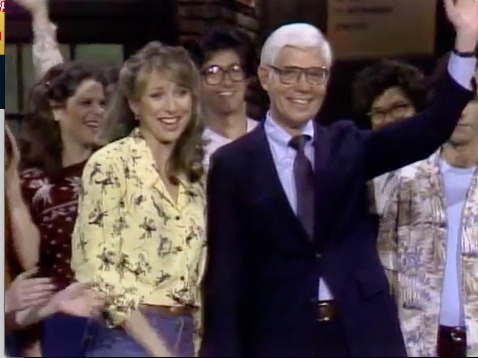
“This is John Anderson, now you know who he looks like!”
Related:
WickerBreaker’s summary on the episode
SNL a Day’s summary on the episode
216. “President refuses to attend debate” (September 11, 1980)
Facebook | Etsy | Retail History Blog | Twitter | snapchat (thelastvcr) |YouTube Playlist| Random Post | digital tip jar | Instagram @ thelastvcr |other tumblr | Ko-fi donation |
#1980#the 1980s#1980s#saturday night live#snl#terri garr#b-52s#john b. anderson#gilda radner#laraine newman#jane curtin#garrett morris#bill murray#mr bill#vance degeneres
1 note
·
View note
Link
THE ROBO SHOW
MECHS & MOBILE SUITS
Opening February 12th 7-10pm
Reception at Light Grey Art Lab
"Black smoke belches from the exhaust pipes beneath greasy armored plates. Steam courses through the cylinders and the 22 pistons jerk frantically back and forth, propelling your huge mass forward down the damp cobblestone streets. Frightened eyes peek from behind sooty curtains -- the unmistakable clanging of steel can be heard from a mile away in the still night. . ."
Join us for the opening reception of the ROBO SHOW, February 12th from 7-10pm. This upcoming exhibition calls 70 artists to create original designs, mech allies, mobile suits, prosthetics, flying machines, bionics, war ships, and vessels - the ROBO SHOW celebrates real and imagined technology, and the mad genius behind the machines we would love to pilot.
The contributing artists have taken on the role of illustrative engineers. The work featured may be inspired by a range --WWI machinery, science fiction vehicles, fantastical objects, space crafts, and artillery - these mobile suits belong in distant lands, futuristic planets, and foregone cities.
The opening reception is free and open to the public. The exhibition will be on display through the end of March, and limited edition prints available on the Light Grey Shop throughout the show.
Artists Include: Alex Dos Diaz, Adam Hoppus, Alyssa Winans, Ameorry Luo, Andrew Kolb, Andy Bennett, Angela An, Ashley Mackenzie, Boya Sun, Brett Martin, Bridget Underwood, Chris Kindred, Chris Schons, Ciel Bahena, Colin Foran, Dacosta, Darla Okada, Ed Skudder, Eli Minaya, Emory Allen, Evan Palmer, Iain Matthiae, Isuri Merenchi Hewage, Jason Holt, Jasu Hu, Jesse Lindhorst, Jesse Riggle, Jessica TC Lee, Joe Maccarone, John DeLucca, John Lee, Jon Marchione, Jorge De la Paz, Junyi Wu, Justin Oaksford, Karina Rehrbehn, Kate O'Hara, Lara Paulussen, Leonard Peng, Linda Yan, Liz Parlett, Liz Pulido, Louie Zong, Maggie Chiang, Marisa Seguin, Martin Gee, Michael Janzen, Nicholas Bono Kennedy, Nicole Miles, Paul Reinwand, Phoenix Chan, Pierre Kleinhouse, Primary Hughes, Priscilla Boatwright, Rafael Mayani, Ricardo Bessa, Richie Pope, Rodrigo Avilés, Rory Phillips, Sander B, Shawn Pedralba, Sherif Habashi, TyRuben Ellingson, Vaughan Ling, and Vero Navarro.
1 note
·
View note
Text
Globe, November 30
You can buy a copy of this issue for your very own at my eBay store: https://www.ebay.com/str/bradentonbooks
Cover: The palace lured Princess Diana into death trap

Page 2: Up Front & Personal -- Sienna Miller shooting Anatomy of a Scandal, former soap star Wanda De Jesus and longtime partner Jimmy Smits take a walk in Brentwood, Mama June Shannon gambles on plastic surgery
Page 3: Billy Dee Williams may walk with a cane but he doesn’t let that stop him from taking the wheel in West Hollywood, Joey Fatone at the Fort Lauderdale International Film Festival, Ariel Winter lugs around a massive roll of bubble wrap in L.A.
Page 4: Courageous Al Roker has battled health problems for years and now his new devastating prostate cancer diagnosis seals his rep as the unluckiest man on TV
* Patrick Duffy and Linda Purl are proof that love can be just as wonderful in your golden years and now pals predict their whirlwind romance will lead them to an elopement -- the former Dallas star was heartbroken after his wife of 43 years died of cancer in 2017 but Happy Days alum Linda brought joy back into his life -- the greying sweethearts plan to spend the holidays with both their families and then go house hunting for their own place
Page 5: Kanye West thinks he’s so smart and wonderful and creative he’s showering bucks on a project to make a posse of his own personal mini-mes and he sees his clones as his gift to the world claiming it’s his duty to keep himself on the planet at all costs long after he’s gone so death doesn’t have to be the end of Kanye -- Kanye’s wife Kim Kardashian has given Kanye permission to double down on himself -- he’s also fascinated by cryogenics and no one would be surprised if he arranges to have himself stored in a chamber when he dies so he can be revived years later
Page 6: Britney Spears is having another family feud because she wants her dad Jamie Spears suspended immediately from his role as co-conservator of her estate claiming he installed a new business manager to run her $60 million fortune without consulting his daughter in what she brands a blatant attempt to get full functional control of her assets and books and records in the face of Britney’s objections
* Ryan Seacrest is turning into a bloated recluse as career and personal problems have worried pals thinking about an intervention -- he’s so devastated by his breakup with Shayna Taylor and the end of cash cow Keeping Up with the Kardashians that he’s shutting himself away for days on end and ignoring calls from friends and co-workers and only responding to texts and he’s stuffing his face with junk food and sloppy takeout and pizzas and he’s come close to belching on camera a few times
Page 7: Devastated widow Paulina Porizkova who her bitter husband Ric Ocasek cut out of his will even though she took care of him in his final days suffered a shocking collapse -- she had gone to Costa Rica with her sons for a change of scenery following the death of Ric who was divorcing her -- she says she had a total nervous breakdown in the airport and they had to put her in a wheelchair to take her back to the plane
* Abby Lee Miller is learning to walking again -- the former Dance Moms star had been using a wheelchair after undergoing chemo for Burkitt lymphoma and having life-saving spinal surgery but she’s now cancer-free and recently underwent an elective operation to help regain mobility -- even though Lifetime canned her plan spinoff Abby’s Virtual Dance Off over charges she’s racist she claims to have a scripted show and two reality series in the works
Page 8: Mike Tyson says he once used a prosthetic penis loaded with his infant son’s pee to pass a drug test during his hard-hitting heyday in the ring and although he swears he never took performance-enhancing drugs he has been blunt about his history of toking weed and snorting cocaine
* Pioneer Woman Ree Drummond reveals she has a foster son named Jamar -- Ree who has four children explains she couldn’t talk about Jamar until he turned 18 and state agency restrictions no longer applied
Page 9: Beloved Jeopardy! host Alex Trebek went to his grave harboring a bitter grudge against talk star and game show rival Regis Philbin -- Alex and Regis began their feud in 2000 when Alex slammed Regis’ Who Wants to Be a Millionaire? as a game show for dummies and Regis was deeply hurt by the dig and shot back that face to face if Alex says anything about Millionaire he’d just look him in the eye and say is that your final answer, Alex?
Page 10: Inside the modern Mafia -- blogs and blunders and killer cops
Page 12: Celebrity Buzz -- Adam Brody shows off his bod in Malibu (picture), Lamar Odom was seemingly back on a marriage track to wed fitness instructor Sabrina Parr next year but Lamar’s engagement was abruptly called off amid ominous sparks of ongoing trouble for the athlete and Sabrina sad she’s no longer able to be by Lamar’s side while he seeks the help he so desperately needs, Mina Starsiak of Good Bones wants a postpartum tummy tuck pronto, things got bristlier than an old broom for Anne Hathaway groveling her way out of massive fan backlash for her appearance on The Witches remake for the insensitive way she portrayed a three-fingered witch with split hands, behind the scenes at The Tonight Show where Jimmy Fallon recently extended his lucrative contract to host the struggling late-night talk show past 2021 but his head writer Rebecca Drysdale lasted six months of butting heads with Jimmy and his cronies before getting dumped
Page 13: Katie Holmes and boyfriend Emilio Vitolo Jr. (picture), Sean Stewart in a leg cast in Beverly Hills (picture), Busy Philipps puts on lip gloss on the NYC set of Girls5Eva (picture)
Page 14: Dave Grohl got scared stiff recording an upcoming album in an eerie L.A. home reportedly rocking with paranormal activity and when he got nosy about the place’s past he apparently got answers from the landlord along with an NDA form meant to keep him from spilling secrets, RHOBH star Kyle Richards’ half-sister Kathy Hilton is joining the show; socialite Kathy cold-shouldered Kyle and her husband Mauricio Umansky when he left her husband Rick Hilton’s real estate company to launch a rival biz
* Fashion Verdict -- Jana Kramer 7/10, Michelle Dockery 4/10, Gretta Monahan 3/10, Charlize Theron 2/10
Page 16: Ailing pop star Phil Collins is being so publicly humiliated by his two-timing ex-wife Orianne Cevey who dashed his dreams of a permanent reunion by secretly marrying another guy pals now fear for his life -- Phil is currently battling Orianne in court over his $38.6 million waterside Miami mansion which she and new husband Thomas Bates have now agreed to vacate but Orianne is demanding half of the home insisting Phil promised her a 50 percent share when they moved into it in 2016 -- Orianne also claims that Phil became a hopeless addict in 2017 hooked on booze and pain pills and after two years of drug hell he was incapable of having sex and he stopped showering and brushing his teeth and had become a hermit
Page 17: Troubled Jonathan Rhys Meyers crashed his car in Malibu and failed a field sobriety test and was slapped with a misdemeanor DUI
* Teresa Giudice has found new love with business man Louie Ruelas just two months after divorcing deported jailbird Joe Giudice -- the Real Housewives of New Jersey star who has four girls with Joe hooked up with the dad of two and digital marketing whiz and both are very happy
Page 19: 10 Things You Don’t Know About David Giuntoli
* Sophia Loren says early in her career she told a director to buzz off when he suggested she surgically alter her nose -- she recalls telling the meddling moviemakers her nose is going to stay there forever and it has a lot of personality
* Parkinson’s patient Michael J. Fox admits he may be forced to say goodbye to Hollywood because his short-term memory is shot and acting is getting tougher to do
Page 20: True Crime
Page 21: Desperate to salvage his tarnished reputation and career Johnny Depp is hoping to hook up with another Hollywood outcast in former co-star Angelina Jolie -- Johnny and Angie first flirted while filming The Tourist in 2010 but at the time Johnny was with Vanessa Paradis and Angie was with Brad Pitt -- Johnny recently reached out to Angie to jumpstart their friendship and he’s been sending her poems written with her in mind and suggestions for book to read and music to listen to and they’ve exchanged a series of emails and texts and talk on the phone quite a bit so Johnny has hope to win her heart and they’re making plans to meet in L.A. very soon but the ball is in Angie’s court and she’s open to having a little fun but don’t count on anything getting too serious
* Johnny Depp’s career has taken another hit as he’s been axed from the Fantastic Beasts film franchise after a British court determined he beat ex-wife Amber Heard at least a dozen times
Page 24: Cover Story -- Princess Diana was lured to her death by a twisted dirty tricks campaign orchestrated by the palace -- acting at the direction of Queen Elizabeth’s hard-case husband Prince Philip British intelligence officers mounted a clever operation to drive Prince Charles’ emotionally fragile wife to the breaking point and they knew she was frantic and suicidal and vulnerable and played on her worst fears -- Diana’s own brother Charles Spencer has also broken a 25-year silence to expose a plot against the People’s Princess and he reveals forged documents and a whisper campaign hinting at treacherous betrayals fueled her paranoia and desperation and despair and pushed her into a decision that ultimately cost her life
Page 26: Health Report
Page 30: Rock legend Jerry Lee Lewis vowed to keep wailing ‘til the end but the 85-year-old stroke victim now spends his days listening to his old hits and staring out the window and his health has taken a tragic turn for the worse since he was clobbered by the stroke last year -- he’s hunched over and seems confused and he’s forgetful and can’t remember some of the lyrics to his oldest hits; he tries to play the piano and just can’t because his hands are so stiff and don’t move the way he wants them to
* Mel B claims she’ll go bankrupt if a judge doesn’t lower the $500,000 she’s been ordered to pay her ex-husband and if the sum isn’t modified she will in all likelihood have to file for bankruptcy -- Mel and ex Stephen Belafonte divorced three years ago and have been slugging it out in court ever since
Page 44: Straight Talk -- lifestyle queen bees Martha Stewart and Gwyneth Paltrow are at each other’s throats but their furious feud is hard to understand because they’re not really in the same business -- Martha is the ultimate homemaker peddling recipes and furnishings and decorating tips while Gwyneth’s New Age-style Goop website is a sleazy sex shop with items normally found in tacky joints along West Hollywood’s sleazy Santa Monica Boulevard
Page 45: Sinead O’Connor is taking a break to enter a one-year trauma and addiction treatment program after losing a loved one and she admits she’s been addicted to weed for 34 years but became briefly addicted to another drug following her loss
* Sean Connery’s wealthy widow Micheline Roquebrune could end up behind bars and fined a whopping $28 million if convicted of stiffing the Spanish taxman -- the tax-cheat case spans back to 1999 when Sean sold their Marbella mansion on the glitzy Costa del Sol; Connery’s lawyer and the mayor of Marbella and six other elected officials were jailed over a tax-cheat scam involving the property but in 2014 Sean was told he wouldn’t be prosecuted but now Spanish bigwigs say the case has not gone away and want to indict his widow for tax fraud
#tabloid#grain of salt#tabloid toc#tabloidtoc#princess diana#charles spencer#queen elizabeth#prince philip#johnny depp#angelina jolie#al roker#patrick duffy#linda purl#kanye west#britney spears#ryan seacrest#abby lee miller#mike tyson#alex trebek#regis philbin#phil collins#jonathan rhys meyers#teresa giudice#david giuntoli#sophia loren#michael j. fox#jerry lee lewis#mel b#martha stewart#gwyneth paltrow
1 note
·
View note
Text
Entering into a new dawn of Corporatist Neoliberalism, all while leaving behind a rising Fascist Empire. A solid Bob’s Burgers and a surprisingly decent Simpsons is your reward.
“Fast Time Capsules at Wagstaff School” once again finds the show operating in the territory it does best: A Poignant twee commentary with the junior Belchers and a nearly pointless sideplot with the adult Belchers that actually sports a satisfying conclusion. The ingredients of a quality kids subplot requires a touch of Tina having the conflict of wielding too much power passed down to her by Mr. Frond whose mere appearance reliably bumps an episode up a notch. This episode not only also weaves the usual Tammy and Jocelyn jealousy games with Tina but also splashes two other of Tina’s peers into the mix: Jim Gaffigan’s Kelsey Grammar indebted Henry Haber and girl friend Sasmina voiced by National Treasure Aparna Nancherla. The episode focuses primarily on Tina’s gatekeeping of the contents of the Wagstaff time capsule. A particularly timely concept for a year where history is a constant 24/7 newsfeed of dramatic historical importance.
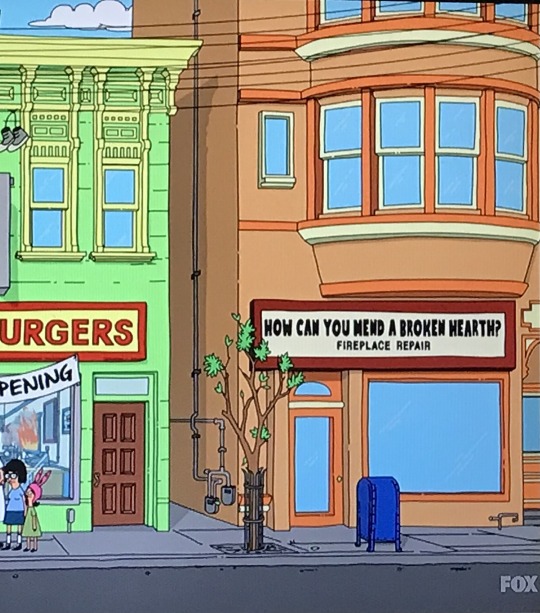
I fold up my muted pink streaked swimming trunks and put them into my personal time capsule. No way will I ever be braving a public beach or swimming hole. The act of exposing any amount of flesh during a pandemic is unthinkable, but in another 50 years I am sure there will be a lot more living to do. The episode goes even further in poignancy with layering a coinciding Louise conflict over a pair of Boyz4Now lands a lot differently in these Quarantined Times. Never have I related to Louise and her desire to go see a cute pop group sing in an intimate live setting, singing such hits like “Your Heart Fell On The Floor, Let Me Get It For You,” a level of cuteness not even Belle and Sebastian or The Magnetic Fields could probably come up with. The main plot moves along with a clean efficiency of storytelling bringing Louise and Tina conspiring together using their combined sister brain to retrieve the tickets, but due to further conflicting interests. The episode concludes with the characters taking their personal losses and rolling with the punches, which is another central sweet spot. Earlier on the series I felt like the Belcher family were constantly losing and being put down upon by the world around them. The pendulum of justice remains in flux giving the Belchers and friends minor victories, but the last image of this episode really gets to me. The sight of group of kids in a parking lot bonding by singing the hit “Someday We’ll Spoon” as it plays off in the distance. Another song title that hits so much harder than it ever could have without the rampaging socially distanced disease.
“If you see a cop, whistle!” - Teddie, and me whenever I see a cop because I always make sure to harass and wolf whistle at cops like they were a piece of construction worker street meat.
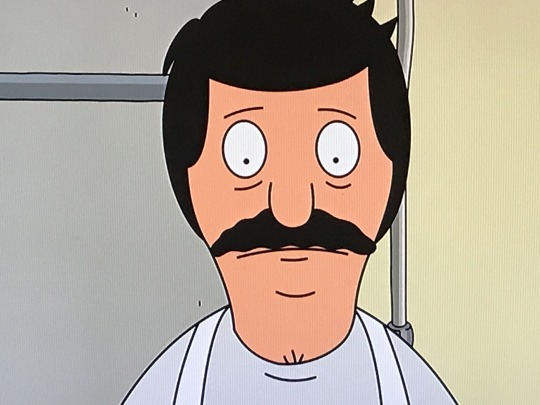
One of my new favorite Bobspressions.
The B plot with Bob and Linda is essentially that Bob can whistle, but Linda cannot, although Linda can roll her R’s. This teasing and taunting domestic squabble is cushioned by the looming gentle omnipresence of Teddie. Teddie, Bob and Linda are a solid trio and play off each other as characters really well and the repartee between the characters feels a lot looser than it has in past episodes of this season. The subplot culminates in Teddie making one of my favorite comedic moves being dependent on his parasocial relationship with Bob and Linda’s marriage. Teddie is the friend that believes in the love of his friends’ marriage more so than his own friends do and it’s always pretty touching to see Teddie play that card. The adults largely stay completely static inside a one-shot of the restaurant with Bob in the kitchen window, but there is a discernible rise and fall conflict between Bob and Linda that culminates with simple silly sweetness. Once again the adults are left fuddling around in their comfortable boxes and squares they have created for themselves, while the children are foisted out in the world having to deal with Future.
One other particularly timely one-off joke that the writers would have no way of knowing how timely and off-putting it would be is when Eugene makes a reference to Sean Connery. Gene compares Linda to the late actor responding to Linda on her R syllable rolling flexing. I am sure the writer of the episode felt some kind of something with this episode airing a week after the man died.
This episode is a Boyz4.5(4)Now.
///

Thankfully this next episode of the Simpsons did not trot out Mr. James Bont. Episode 5 of Season 32 “The Seven Beer Itch” is a rebound episode from the last three exhausting conceptual excursions. I failed to do a write up on the Season 32 premiere episode, “Undercover Burns,” which I give a Pass (A Pass btw means that you won’t be harmed passing this show through your system, whereas Skip speaks for itself). Both the season opener and this fifth episode are just Simpsons episodes based in and around Springfield. No historical role-play or contrived literary surrogate puppet shows. This episode initially begins filling the viewer with “Simpsons on Holiday” dread opening the episode with The Groundskeeper Willie serving as the episode’s narrator. What’s completely confounding is that Willie has no bearing on the plot of this episode in any way whatsoever other than the fact that both he and UK Treasure Olivia Coleman are both from across the Pond.
The Simpsons have become one of the most musical series on television, and frankly it saps away the energy of the when songs pile on top of one another. I know I should be more wickedly delighted by having The Gosh Dang Favourite singing a pub song to Homer at Moe’s Tavern, but instead these songs make me go dead inside. Especially when Dan Castellaneta has to be a total diva belching out melodies with honey voiced Barney. Maybe if the songs were relegated to once a season or specifically to the ending credit sequence a la Bob’s Burgers that would be one thing, but a song (or three! Or five!) per episode is simply too busy. Then again “busy” describes everything about the Simpsons in 2020. The show continues to astound me visually with Springfields starry purple skies, brief glimpses of London clock towers served up alongside Marge and kids trip to Martha’s Vineyard. We even take a pit stop in California with Olivia Coleman’s Lily doing a forced, weirdly gentle riff with Leonard DiCaprio (who goes uncredited, making matters even stranger). Overall, modern Simpsons is the nicest looking adult animated sitcom around until Tuca and Bertie comes back on air. That being the said the plots of each episode feel like they are being pulled out of a magic foam wizard’s hat stuffed to the brim with Simpsons conceits. This week the writer’s pull Homer Seduction from out of the hat.
The Homer seduction plot can be traced back as early as Season 3 with the episode “Colonel Homer.” This episode more or less grafts its main plot swapping out a Pretty Country Singer with a Charming British Lady. The songs in “Colonel Homer” were actively related to the plot with country star Lurleen Lumpkins becoming infatuated with Homer Simpson, because he’s, he’s a simple and um sweet man. Homer has fidelity! 32 plus years on the air and Homer still remains the kind of man that will still choose his wife over whatever hot piece of Academy Award Winning voiced action comes his way.
I will end this review with this image of Homer giving us viewers come hither and fuck me eyes. Imagine an artist sitting down and drawing Homer Simpson giving you this coquettish glance and try not feeling sick with existential dread:

This episode deserves a Pass.
///
Addendum:
A response to Digital Spy and hand wringing queerness out of a cartoon child

The article in question is available here.
The journalist of this article insistence that Lisa be a LGTBQ+ icon is understandable, but taking umbrage with Yeardely Smith’ for saying that she views Lisa as a child is queasy and infuriating. Smith isn’t a Karen trying to rob Lisa of her Queer freedom. Lisa’s queerness is innate and subtly woven into the character and explicitly spelled out in future glimpses of the character. I really shutter to think what the Simpsons mostly white and male writers room would concoct for a “queering” of Lisa. Dissecting and analyzing a cartoon child’s sexuality is all fun and games, but the world is also dying and full of real life children, not cartoon characters, in pain far more worthy of our concern. I would much rather there be support for Queer artist making their own adult animated sitcom and let Lisa Simpson just be a little girl that loves as Yeardely Smith calls “girly things.” Interpret this literally. Lisa is a cartoon girl living in a cartoon world and she’ll probably grow up to be a nonbinary polyamorous Super Computer or Sax Master General.
If you haven't already I strongly recommend readers check out Smith’s appearance on the currently defunct podcast Harmontown. In the episode “I Was A Simpson” she comes across as charming and thoughtful and worth a listen. She’s not someone that strikes me as a hateful advocate of queer erasure. She strikes me as a cagey performer not wanting to nail down too many concrete details about her character. Ultimately the writers and Smith know Lisa is a queer character, but unless the show is willing to hire a LGBTQ+ writer to help create a Queer Coming of Age centric coming of age episode I am content with having her identity be nudged and winked at in glimpses of the future and left at that. Good grief.
#Tv#Tv series#TV review#bob's burgers#the simpsons#2020#fall 2020#fox#animation domination#Oliva Coleman#feminism#lgbt representation#lgbt discourse#lgbt#harmontown
1 note
·
View note